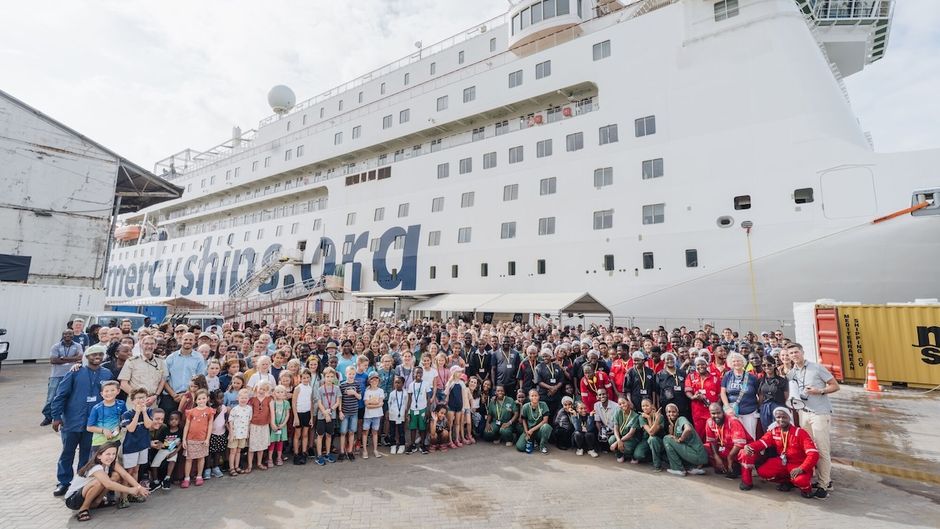Mercy Ships: health care and medical training beyond the seas
The Christian NGO works mainly in sub-Saharan Africa, with two ships that allow it to perform 6,000 surgeries a year and train over 3,000 native health workers.
Protestante Digital · TENERIFE · 10 JULY 2024 · 15:00 CET

The ship Global Mercy, from the Christian NGO Mercy Ships has just docked in the Spanish port of Santa Cruz de Tenerife after working for months in Sierra Leone, where they have performed around 2,000 surgeries and trained over 140 native health workers.
It is one of two ships with which the organisation is bringing health care, medical training and infrastructure and sustainable development projects to Africa, especially in the sub-Saharan region.
"Every two seconds a person dies due to lack of access to safe, affordable and timely surgery", says Gerardo Vangioni, president of Mercy Ships in Spain, quoting data from the medical journal The Lancet.
He points out that "there are nations where there is not even one surgeon for every 100,000 inhabitants, nations where there are only two anaesthetists to attend to the whole population, and in the vast majority of sub-Saharan African nations there is no public health system, so that you either have resources or you live with your illness or you end up dying".

Two hospital ships
In addition to the Global Mercy, the NGO operates the Africa Mercy, which is docked in Madagascar since February until the end of the year.
With both hospital ships (the largest civilian ships of their kind in the world), they are able to carry out around 6,000 surgeries a year and develop training projects for over 3,000 local health workers.
They also "continue to strengthen health systems in the nations where we have already been with programmes that contribute to further strengthening health systems", explains Vangioni.

Five years ago, the entity signed an agreement with the Gamal Abdel Nasser University of Guniea Conakry, "to continue training dentists, not only from Guinea, but also from neighbouring countries".
Furthermore, it is now planning to build a new hospital ship, which it hopes will be ready in four years. "We are doing this thanks to generous donations", says Vangioni.
"It will be similar in size and equipment to the Global Mercy, so that in five years we will have three hospital ships working, and we will be able to reach more people and serve more nations", he adds.
Volunteer work
Mercy Ships acknowledges that there is a great need, and the aim is to "be able to reach all areas with the resources and the right people to transform lives and contribute to the nations" in which it works.
"We always have to keep in mind the evolution of events in Africa, where on the one hand, coexistence is worsening, and on the other hand, governments are not investing in health as they should", stresses the president of the NGO.
Volunteers continue to be key to the development of humanitarian work.

Although the NGO has thousands of volunteers from over 60 different countries each year, the need is always there, "in all areas: medical, maritime and general", underlines Vangioni.
"We need nurses, surgeons, anaesthetists, radiologists, physiotherapists, ophthalmologists, dentists. But we also need officers, engineers, sailors, electricians, carpenters, cooks, administrative staff, logistics and supply staff, photographers, marketing, drivers and teachers (each ship has a school for the children of volunteers who come for a year or more). In short, the people it takes to run a small town are the people we need on board".
That is why they encourage Christians to share information about Mercy Ships in the workplace, as a first and most basic form of collaboration.
"This ministry is not much known. Spreading the information will help to raise interest and may promote the desire to cooperate, either on a voluntary or financial level", stresses Vangioni.

How to collaborate
In addition to outreach and volunteering, "this ministry began in a prayer meeting, has been sustained through prayer and will continue through prayer. Prayer is essential to be able to carry out this mission", he points out.
Another way to contribute is with financial support or with services and resources. Everything they do, surgeries, training and development programmes, are offered free of charge.
"We can only continue thanks to donations from individuals, companies and institutions. As Mercy Ships is covered by the patronage law, all donations received, whether monetary or in kind, are tax deductible", concludes Vangioni.

This article was written for the Líderes Empresariales section of Protestante Digital, an initiative of the Gospel, Economy and Business (Tres-E) group in Spain.
One more year
Learn all about our #OneMoreYearEF campaign here (English).
Published in: Evangelical Focus - life & tech - Mercy Ships: health care and medical training beyond the seas
